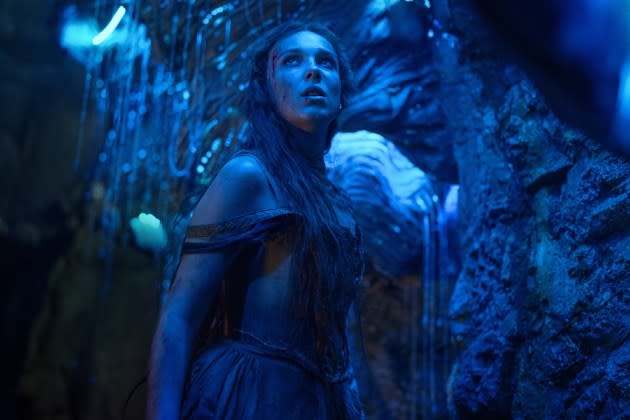‘Damsel’ Review: Millie Bobby Brown Adds Needed Spark to Netflix Fairy Tale That Subverts Convention in Overly Familiar Ways

When the young women lock eyes, a quiet intimacy blooms. Elodie (Millie Bobby Brown) doesn’t know the unnamed girl meeting her gaze from a balcony some distance away, but she feels connected to her. Their smiles awaken flashes of mutual recognition. They share a milky complexion and gentle regard. But this stranger is more than Elodie’s mirror; she is an eerie omen of the young princess’ fate.
In Damsel, Elodie tries to escape the conventions of her own story. Trapped in a world of manners and expectations, the princess seeks adventure and longs to prove her independence. The conceit is familiar: A handful of recent films (and TV shows) have given audiences royal women eagerly subverting the tropes of medieval romances. Disney’s Brave introduced Merida, a fiery archer who brought a more overt contemporary feminism to the entertainment conglomerate’s brand. The Princess starred Joey King as the titular royal who roundhouse-kicks her way out of an unfortunate betrothal. And in Kay Cannon’s Cinderella, the overworked protagonist (Camilla Cabello) cares more about opening a clothing store than finding a prince. These stories feature active princesses, heroines who understand they must deliver themselves from distress.
More from The Hollywood Reporter
Like its predecessors, Damsel bluntly organizes itself around this powerful notion. The film, directed by Juan Carlos Fresnadillo and written by Dan Mazeau, is about a headstrong woman from a vaguely sketched kingdom whose engagement (to a wealthier prince) takes an unexpected and near-fatal turn. Fresnadillo’s film puts on fewer airs of disruption than other versions of this story, so the narrative comes off as less self-satisfied. Still, it struggles to sustain an inspirational tenor.
The film opens with a declaration of intent. “There are many stories of chivalry, where the heroic knight saves the damsel in distress,” Elodie says, through voiceover. “This is not one of them.” We meet the face behind the voice and her younger sister Floria (Brooke Carter) as they are chopping wood and discussing ways to help their impoverished kingdom. A particularly harsh winter has left the townspeople cold and hungry. Elodie, feeling a great sense of responsibility, suggests that the family donate their belongings. Floria, less inclined to self-sacrifice, disagrees. There must be another way.
In these times, marriage becomes the only other option. When Elodie and Floria return to the castle, their reserved father (Ray Winstone) and striving stepmother (Angela Bassett) announce that the eldest daughter will marry Prince Harry of Aurea (Nick Robinson). Never mind that Elodie has never heard of this kingdom or its royals. The family packs a ship and sails off to the more prosperous castle. Here and in other places, Mazeau’s screenplay suffers from a lack of details that would bolster the story. Damsel may have opened with a confident proclamation, but it falters as soon as the action starts.
When Elodie and her family arrive at Aurea, the difference between this land and theirs is apparent. DP Larry Fong uses aerial shots to survey the landscape, a verdant terrain patterned with striking flora and textured with rugged mountains. We swoop into the castle, where the royal family lives a life of lavish charm. Amanda Monk’s costume design cleverly differentiates the status of the two families. Queen Isabelle (Robin Wright, appropriately slinky in a clever casting choice) courts Elodie and her father Lord Bayford with flattery and easy smiles, but malevolence lurks in the shadows. The politics of this fictional land boil down to an old story and an ancient curse. Centuries ago, a violent transgression forced the then-king of Aurea to make a pact with a dragon. Atonement would require the sacrifice of three daughters to the mythical reptile for eternity.
So the union between Elodie and Prince Henry is a trap, a sinister plot to sacrifice the princess to the dragon. A similar fate befell the young nameless woman Elodie saw from her window the day of her arrival. Their interaction raises some questions, and one wonders if Elodie, for all her suggested intelligence, ever inquired about the existence of another princess in the castle.
Damsel is on sturdier ground when it can abandon the logic of narrative for the muscle of action. The royal family deposits an increasingly skeptical Elodie into a cave, leaving her to face a fiery death. But the young woman refuses this fate and endeavors to find an escape route. Monk’s costume design impresses, as Elodie must use parts of her dress to engineer her way out of dire encounters with the dragon (voiced by Shohreh Aghdashloo) and the maze of its underground lair. As she tries to get out, Elodie comes across the spirits of other sacrificed damsels.
Brown brings the same energy here as to her role in the Enola Holmes series. Elodie, like the Victorian-era detective, approaches puzzles with an inspired grit. Rooting for her is not complicated. As always, the Stranger Things actress’ strength as a performer lies in her expressiveness — the wide eyes of fear and grimaces of pain. Her portrayal, which has shades of Emilia Clarke’s Daenerys Targaryen, sustains a film that would have benefited from more depth, especially because its penultimate battle offers a moment of welcome cleverness. In that scene, Elodie gathers her strength to face the monster chasing her. Their encounter, a meeting at the threshold of life and death, is tense, but in their eye contact is something familiar: a chilling flash of mutual recognition.
Best of The Hollywood Reporter

 Yahoo Movies
Yahoo Movies 
